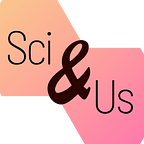Humans of Scicomm: Sadie Bowman on Becoming a Science Performer
Sadie’s piece is part of Science and Us’s on-going publication, Humans of Scicomm. All stories and experiences are written by the respective science communicators. Links to reach out to Sadie and Matheatre are located below. Thank you for your support!
It started with either dance or music — I can’t remember which. During my childhood, both were ever-present sieves through which I filtered almost every experience. Rhythms and harmonic patterns were my unarticulated emotions, captured in the swoop of a melody or the artfully resolved tension of a pas-de-beret. I learned to play the piano, spending hours every day absorbed in passages of Mozart, Chopin, Gershwin, and Scott Joplin. Chasing not just the notes, but the feelings and the stories that the notes had to tell, if I could only gain enough skill for my hands to invite the harmonies to reveal their stories. I remember seriously creeping myself out once when I was practicing a Chopin prelude in the waning twilight, having been at the keyboard so long I hadn’t noticed the daylight was almost gone. The melody actually ached in the dusk. I could feel it. I remember the music giving me a palpable feeling of how short life is and how painfully sweet and sad it is to be alive. It wasn’t something I could articulate or fully understand because I was young and had no business contemplating mortality just yet, but the music made me feel connected to a deep and forceful river of human experience, and there were lifetimes of feelings encoded in those notes. Dance could conjure similar experiences, tapping into emotions that were far older than me, handed down time and time again through these musical motions.
From music and dance came my obsession with theatre. Theatre could make direct use of music and dance to tell a story or use its words and narrative structure to convey the same artful sense of tension, phrasing, crescendo, and climax. Words and language are delightful things to manipulate, to savor, to choreograph — and the timing of a joke, the rise, and fall of an argument, or the sudden swift sting of a tragic verbal revelation are deeply visceral experiences.
Getting into theatre helped lead me to the understanding that making people laugh is another incredibly powerful experience. Shared laughter creates an instant connection, the type of connection that can carry a million data points. I felt like an awkward, friendless weirdo until I understood the power of making someone laugh. Friendships were forged through laughter. I found who I was through laughter.
And all of that is what led me to math and science.
I never imagined being any kind of science communicator. At all. It wasn’t until I was 26 years old, working a desk job by day, doing theatre and producing a comedy variety show by night, that the path of STEM communication revealed itself to me. A close friend of mine was teaching high school calculus and had started setting rules and formulas to popular melodies in order to help his students remember them. And it really worked! Connecting math concepts with music and all its codified emotions really served the students not only in memorization, but in comprehending, enjoying, and applying what they were learning in math class. For me, however, it started out as a joke. The comedy variety show producer in me, looking for a laugh, said, “Hey, why don’t we take these songs and make them into a show…we could call it Calculus: THE MUSICAL!” I probably even made ironic jazz hands at the time. At the time I was not seeking an emotional connection with math. I didn’t think that was possible then. I just thought it would be funny.
But it worked.
I had not understood until then, that the feelings I had about my relationship to the arts actually paralleled the feelings that mathematicians experience in their relationships with numbers. Like music, math is a complex and ancient language, another deep river of human experience that connects people across generations, and connects people to the experience of life itself. Performing a musical comedy production about calculus invited all sorts of people to describe their love and passion for math to me. For the first time, I could palpably understand, through these stories, that math allowed people to express themselves and discover who they were, just as performing arts had done for me. As I heard all these different stories, it opened me up to a new perspective on what the sciences even are. Math and science are essential to humanity, just like the arts. Understanding other people’s love of math and science has inspired me to use my skills as a performer to open the minds of those who haven’t yet discovered the exquisite music of STEM, to invite everyone into this deep and nurturing river of human experience. Just like music, math, and science connect the past to the present to the future.
Matheatre is currently in production for a new musical based on the career of x-ray crystallographer Rosalind Franklin, which will be featured as Season One of their new dramatized nonfiction podcast History Science Theatre, to be released in late 2020 wherever you get your podcasts. For more about Matheatre’s work (including all the ways they’ve adapted the experience of live theatre to the COVID-19 pandemic), visit www.matheatre.com, or follow them on Instagram @matheatre_steam.
